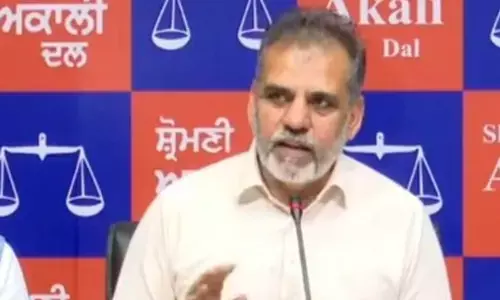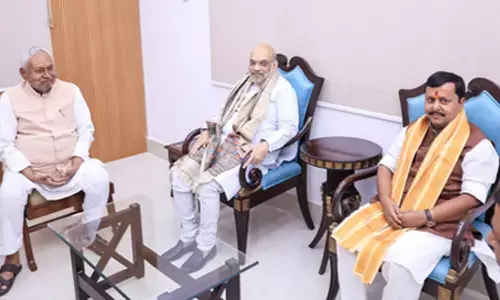Growth to dip, needs stimulus

Notwithstanding the political claims and counter claims on the impact of demonetisation on black money, the disruptive potential of cash crunch on the economic activity is now acknowledged even by the governments.
Notwithstanding the political claims and counter claims on the impact of demonetisation on black money, the disruptive potential of cash crunch on the economic activity is now acknowledged even by the governments.
The state governments which have relatively less revenue elasticity are more worried about the fiscal woes due to demonetisation.
It’s now the time for the governments to infuse stimulus in the economy besides improving the cash flow to fast replace the outlawed notes.
John Maynard Keynes in his ‘General Theory of Employment, Interest and Money,’ argues that the level of employment is determined by spending of money (aggregate demand).
The contractionary monetary policy unleashed by demonetisation without a compensating expansionary fiscal policy would have a negative impact.
The governments should, therefore, declare a stimulatory fiscal spending programme, especially in the informal sector and other low-paid and employment-intensive sectors of the economy.
Centre also has a constitutional obligation to compensate for the loss of revenue to the States
The contractionary monetary policy unleashed by demonetisation without a compensating expansionary fiscal policy would have a negative impact.
The governments should, therefore, declare a stimulatory fiscal spending programme especially in the informal sector and other low-paid and employment-intensive sectors of the economy.
Such a stimulatory fiscal spending programme is essential to tide over the monetary contraction and the subsequent economic recession.
There is an every likelihood of fall in gross domestic product (GDP) at least in the medium-term thereby negatively impacting the government revenues.
This would, in turn, have a negative effect on the government’s ability to spend. Government spending is an important stimulus in a developing economy.
The Fiscal Responsibility and Budget Management (FRBM) regime imposes constraints on the ability of governments to spend. Now the revenue fall would further reduce the government’s spending.
The economy, especially that of the informal sector, urgently requires a stimulus. The real estate sector would be the most hit as this sector is riddled with cash transactions often unaccounted.
In the recent past, the construction sector due to real estate boom remained the prime mover of employment growth in the economy. This employment-intensive sector is most likely to be adversely hit.
Whether or not the property prices fall, the sector is most likely to experience slower growth. There should be a paradigm shift in the real estate sector too.
The captains of this sector should reinvent their business models to keep their business go. The unaccounted cash transactions are mainly in high cost property transactions.
The low cost housing is unlikely to witness black money transactions. The real estate sector should turn the threat into an opportunity to remodel their business to cater to the housing requirements of India’s poor and the lower middle class.
The governments should also come out with a package of incentives to encourage low-cost housing activity.
The state governments should leverage on their land bank to initiate community housing programmes for the lower and the middle income groups.
The construction sector is a vibrant source of employment for skilled, semi-skilled and even unskilled workers.
The construction activity can have a spiraling impact on livelihood generation as a habitat growth would spur a socio-economic activity.
For instance, the Telangana government estimates that in and around Hyderabad, the construction sector provides livelihood for one million workers.
Therefore, mitigating the adverse impact of demonetisation on construction sector assumes greater importance in any anti-recession strategy.
As the Telangana state government rightly recommended to the Centre, a special fund should be created by the Centre and the states to undertake works like house building, road repairs, road construction and development of other infrastructure facilities to productively engage labour who lost their livelihood due to cash crunch-induced artificial economic recession.
John Maynard Keynes in his ‘General Theory of Employment, Interest and Money,’ which is considered to be his magnum opus, argued that the level of employment is determined by spending of money (aggregate demand).
Therefore, massive impetus to construction of public works that can have an economic multiplier effect is a proven conventional economic wisdom to beat the recessionary trends in the economy.
Agricultural market operations are generally cash-driven. The penetration of electronic money in the agrarian and rural economy is very limited.
Thus, the cash chaos seems to be significantly impacting agriculture-related transactions. The media reports suggest that farmers who brought their agri produce to markets are complaining of drastic fall in sales due to non-availability of cash.
The problems of farmers who seek to sell perishable commodities are much more serious. The public procurement through market intervention is very weak.
Often these market intervention measures hardly benefit the small and the marginal farmers.Therefore, the Central and the state governments should step up the market intervention measures and procure the farmers’ produce and distribute them through public distribution channels to mitigate the cash crunch for both the producer and the consumer. The government agencies can rope in financial institutions in this endeavour.
The most important sector adversely affected by the cash chaos is the informal sector that includes petty traders, small businesses of vegetables, fruits, poultry, meat, fish etc.
The negative impact on this sector is due to negligible penetration of banking transactions into the market operations of this sector. The governments should evolve suitable mechanism for revival of these vulnerable sectors.
The small and medium industries that are employment-intensive often run on the institutional credit support.
Their market operations are significantly dampened due to sudden disappearance of cash from the economy.
The recommendation of Telangana Chief Minister K Chandrashekar Rao to the Prime Minister is a notable measure.
The state government urged the financial institutions to allow for delayed debt servicing by this sector.
The farmers are given this window during the agricultural drought conditions. The demonetisation has created a cash drought and an economic dry spell.
Such rescheduling of loans is essential to mitigate the suffering of MSME sector. The financial institutions due to sudden swell of cash deposits are considered to be the chief beneficiary of demonetisation.
Therefore, they should come forward with such measures and the central government should extend support to the banking system in this regard.
Telangana and Andhra Pradesh are the leading producers of perishable produce like horticultural commodities, poultry and meat products. Telangana has the largest poultry industry in India.
The poultry business is primarily cash-based. The state government estimates that poultry business dropped by 70 per cent subsequent to demonetisation. The government should consider relief measures for this vulnerable sector.
The central government has unilaterally declared demonetisation. The concept of fiscal federalism was ignored. The Centre may have its own reasons for this.
But, it has a constitutional obligation to compensate for the loss of revenue to the States. According to the estimates submitted by the state government, the revenue collection in Telangana which includes registration, VAT, motor vehicle tax etc., has dipped by 50 per cent as compared to the corresponding period prior to demonetisation.
The state government estimated that Telangana alone would register a revenue fall to the tune of Rs 7,500 crore in the remaining period of current financial year due to demonetisation.
In fact, Andhra Pradesh would also experience a similar decline in revenues. This would seriously undermine the fiscal muscle of state governments and incapacitate them from implementing development and welfare schemes.
The state governments which are not a party to the demonetisation decision cannot be asked to bear the fiscal burnt of such a monetary policy of central government.
The Finance Commission should step in to come out with a suitable mechanism for compensating the states in the short and medium term.
If unaddressed, it would tantamount to coercive federalism rather than cooperative federalism.










